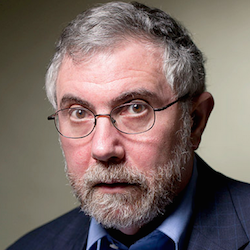 By Jeff Deist Paul Krugman is world-weary. He's tired of being correct, tired of others being incorrect, and tired of the media for failing to make all of this known. He's especially tired of Ron Paul. From his latest New York Times blog: Almost 15 years have passed since I warned about media “balance” that involved systematically abdicating the journalistic duty of informing readers about simple matters of fact. As I said way back when, If a presidential candidate were to declare that the earth is flat, you would be sure to see a news analysis under the headline ”Shape of the Planet: Both Sides Have a Point.” After all, the earth isn’t perfectly spherical. As we see, it's a heavy burden for one man to police the media year after year-- not to mention being the arbiter of simple matters of fact. Why would a reporter credit the Fed’s critics with warnings they didn’t give, and fail to mention what they actually said? The answer, pretty obviously, is that if you were to say “Ron Paul has been predicting runaway inflation ever since the Fed began its expansionary policies”, that would make it clear that he has been completely wrong. And conveying that truth — even as a matter of simple factual reporting — is apparently viewed as taking sides. What Krugman says is less interesting than what he really thinks. But fortunately he's easy to decipher, because his writing is full of poker tells-- what the Left calls "coded language" and "dog whistles" when their political opponents do it. He's writing for a receptive audience, namely New York Times readers who share his fatigue with the flyover yahoos who stand in the way of progress. But while most progressive writers adopt a sneering tone, Krugman chooses to show an almost magnanimous (but resigned) exasperation in the face of an American public that just doesn't get it.
Here are some recurring observations from his blog posts:
Mr. Krugman may well be a man of great intellect, and he may well believe what he professes to believe. But if the 20th century is any guide, being a progressive means never having to say you're sorry. It means never having to claim responsibility for the predictable consequences of the policies you advocate. And in Krugman's case, it means never having to admit that expansionary monetary policy and government spending cannot conjure up general prosperity. Hubris and certainty are no substitute for reality. This article was originally published at The Mises Institute. Comments are closed.
|
Archives
July 2024
|

 RSS Feed
RSS Feed



